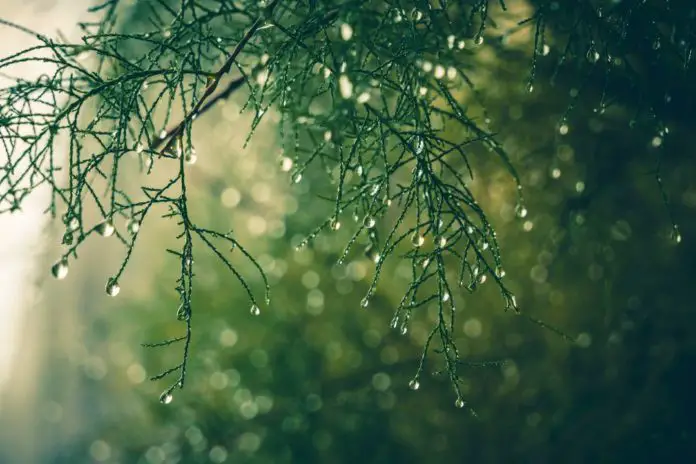
Rain’s fresh, pleasant smell comes from plant oils, bacterial spores, and ozone. Scientists believe our ancestors inherited our affection for the smell of rain.
It’s a hot summer day. You are feeling sweaty and cranky due to the heat. Suddenly, dense gray clouds cover the sky. Big fat raindrops start plopping onto the ground.
Then, it slowly hits your fresh, earthy rain smell. The smell of rain has its name. It is called Petrichor. But rain is just water, and water doesn’t have any scent. So, what makes rain smell so lovely? Well, there is more than one kind of rain smell and several factors that can cause them.
Once, the smell comes before the rain even hits the ground. It’s slightly sweet but also a little sharp. That’s ozone, not the atmosphere’s layer, but it isn’t far off!
Before a thunderstorm, lightning can sometimes rip nitrogen and oxygen molecules in the environment to pieces, which can recombine into nitric oxide.
This substance interacts with other chemicals in the atmosphere to form ozone, which has a sharp smell. The wind then carries this ozone down to ground level, where it reaches your nose!
Actinomycetes, a bacterium known as, cause one of the more pleasant rain smells. These bacteria grow in soil when conditions are damp and warm. When the soil dries out, the bacteria produce spores in the soil.
When raindrops hit the ground, they kick up spores into the air. The moist air effortlessly transports these spores to us, and we breathe them in. However, the spores themselves don’t cause the smell. Instead, a chemical called geosmin, excreted during the production of the spores, is responsible for the distinct scent. This chemical is responsible for the sweet smell after the rain.
The human nose is susceptible to geosmin. Some can detect geosmin at concentrations as low as five parts per trillion.
Since the bacteria thrive in moist soil but release the spores once the soil dries out, the smell is most acute after a rain that follows a dry spell. However, you’ll notice it to some degree after most rainstorms.
Another pleasant after-the-rain smell comes from volatile oils that various plants and trees release. These oils collect in the environment, and when it rains, certain chemicals that make up the oils get released into the atmosphere (usually along with geosmin), causing a familiar and inviting scent.









